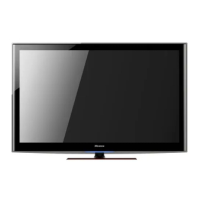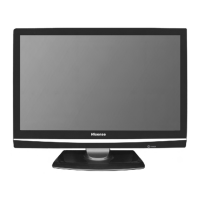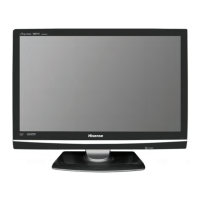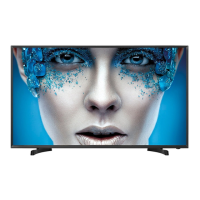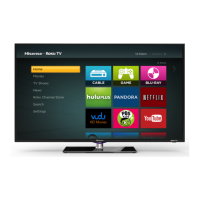Do you have a question about the Hisense HL32K300L and is the answer not in the manual?
Details warranty scope, exclusions, and conditions for parts and labor.
Covers requirements for serial numbers, proof of purchase, and conditions that void the warranty.
Specifies covered faults like workmanship and excluded issues like environmental damage or misuse.
Lists conditions under which the warranty ceases and specific exclusions like consumables or cosmetic damage.
Addresses conditions for LCD/Plasma, pixel defects, image retention, and fees for non-faulty repairs.
Outlines the 36-month in-home replacement warranty process.
Details 12-month warranties for LCDs and a separate service for DVD drive faults.
Steps before claiming, including checks, and the service procedure via phone.
Instructions for registering the warranty by mail with purchase details.
States content use is for non-commercial, subject to third-party IP rights and regulations.
User bears risk for device/content quality; Hisense disclaims express/implied guarantees.
Hisense is not liable for accuracy, completeness, or consequences of information or use.
Hisense provides no warranty for third-party content modification, suspension, or termination.
Explains symbols for dangerous voltage and important instructions.
Guidance on proper recycling of electrical and electronic waste.
Crucial advice on TV placement to prevent falling and related injuries.
Instructions to read warnings, follow operating guidelines, and retain for future reference.
Safe cleaning methods and advice on avoiding liquids and ensuring proper ventilation.
Covers wall bracket usage, stable furniture placement, power source, and plug safety.
Precautions for lightning storms and proper routing of power cords.
Warnings against inserting objects, spilling liquids, and overloading outlets.
Guidelines for qualified servicing, authorized replacement parts, and safety checks.
Information on outdoor antenna grounding and keeping the TV away from heat sources.
Reiterates the severe risk of TVs falling and potential injuries, emphasizing stable placement.
Lists included accessories and provides step-by-step instructions for installing the TV stand.
Identifies and describes the function of buttons on the front panel of the TV.
Illustrates and labels all input/output ports on the rear of the television.
Detailed explanation of each connector type on the rear panel and its purpose.
Guides on connecting aerials, external A/V devices, component, and HDMI sources.
Instructions for connecting a PC via VGA and audio cables, with notes on compatibility.
Details on connecting audio systems, USB devices, headphones, and woofers.
Step-by-step guide for inserting batteries into the remote control and disposal notes.
Information on the effective range and angles for remote control operation.
Identifies all buttons on the remote control and provides brief descriptions of their functions.
Basic operations including turning the TV on/off, selecting video source, and adjusting volume.
Instructions for changing channels and selecting different sound modes.
Guides on selecting picture modes, adjusting aspect ratio, and freezing the picture.
How to set the sleep timer and select audio options like Mono/Stereo.
Method to display the full list of available digital and analogue channels.
How to use the EPG to view program schedules and set up recordings.
Details on recording programs via EPG and using Remind, Info, and Schedule functions.
Initial setup steps for mode, language, country, scan type, and auto-tuning.
Navigating the channel menu for country, tuning type, and auto/manual tuning.
Manual tuning for analog channels and options to edit, move, or skip programs.
How to check antenna signal strength and recommendations if it's low.
Adjusting picture settings like mode, brightness, contrast, color, sharpness, tint, backlight, and noise reduction.
Configuring sound modes, equalizer, balance, auto volume, SPDIF, speaker settings, and lip-sync.
Adjusting OSD language, audio language, subtitle language, and blue screen options.
Configuring clock, off/on times, sleep timer, auto sleep, and time zone settings.
Customizing OSD timeout/transparency, restoring factory defaults, and PVR setup.
Instructions for PVR recording, formatting USB devices, and using Time Shift.
Configuring Auto-Light (DBC) and performing software updates via USB.
Managing lock system, changing password, blocking programs, and parental guidance settings.
Adjusting screen settings like H/V position, H/V size, phase, clock, and auto adjust for VGA mode.
Configuring PC settings, supported VGA modes, and adjusting screen resolution in Windows.
Overview of the DMP browser for viewing photos, music, movies, and text files from USB.
Instructions for navigating and viewing photos, including rotation and zoom.
Steps to select and play music files, including playback speed and track selection.
Guidance on selecting and playing movie files, including playback controls.
How to select and view text files, with notes on compatible file extensions.
Explains the tool bar functions for photo viewing and options for background music and picture info.
A guide to common TV symptoms and their remedies, with contact information for further help.
Technical specifications for different models including screen size, resolution, power, and dimensions.
| Screen Size | 32 inches |
|---|---|
| Display Technology | LCD |
| HDMI Ports | 2 |
| USB Ports | 1 |
| Refresh Rate | 60 Hz |
| Built-in Wi-Fi | No |
| Smart TV | No |
| Resolution | 1366 x 768 |


